#admiral alfonso
Explore tagged Tumblr posts
Text
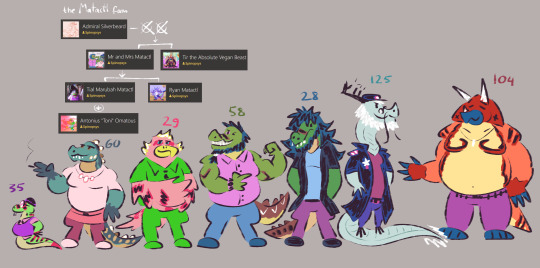
[lore] Matactl family sizes 👀
~ ~ ~
bsky 🦋 | furaffinity 🐾 | telegram channel🎨 | dm for discord server!
#marubahrt#worldbuilding#character reference#oc family#scalie dragon crocodile bird snake triceratops#tial the snake#gabriela the crocodile#toni the bird#alfonso the crocodile#rayan the crocodile#admiral silverbeard the dragon#tir the triceratops#tyr the triceratops
2 notes
·
View notes
Text
Currently unbelievably obsessed with the scene in Skies of Arcadia where Ramirez threatens to cleave Alfonso in two and when it cuts back to Alfonso he is out of his chair and hiding behind it, screaming
I thought I could not possibly love this game any more and experiencing all this shit I don't remember is the greatest gift I've ever been given.
#skies of Arcadia#I wanna see a sitcom about the admirals#they all live in the same giant house together#never do any military shit#it's just 'de loco never takes out the FUCKING trash!'#'yeah I noticed that bc Alfonso is still here!' [LAUGHTRACK]
1 note
·
View note
Text
DPxDC Next Generation Kids (click for clarity)
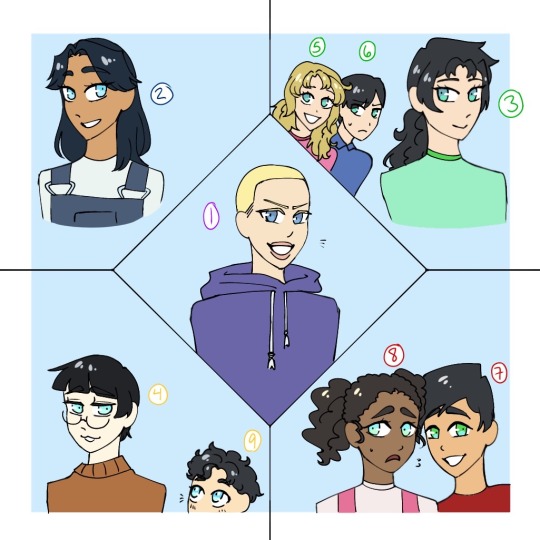
Continue reading for notes and introductions :)
1) Jove Bryce Wayne (11) - Steph and Cass’ adopted son. He trains under Cass and Bruce, and is widely admired by the other kids for creating his own fighting style with the dancing skills he gets from practicing with his mom (to his delight). Fun fact, he is albino!
2) Marillyn “Mari” Maddy Grayson-Nightingale (10) - Dick and Dan’s daughter. She was an accidental pregnancy, but both of her dads love her very much. Fun fact, she gained her baba’s personality and is rather rebellious and mischievous, which causes Dick to feel sympathetic for Bruce.
3) Elinor “Ellie” Catherine Nightingale (9) - Jason and Jazz’s eldest daughter. She, along with Mari, train under Dick, Jason, and Jazz in order to protect themselves. Fun fact, she looks and acts just like Jason when he was young.
4) Thomas “Tommy” Bruce Drake (5) - Tim, Dani, and Kon’s oldest son. He is an evil genius who uses his cuteness to take over the world. Fun fact, the entire PhantomBat family have given up on convincing him not to, so now they’re just trying to instill morals into him and stall for time (they still love him tho).
5) Marianne “Ann” Talia Nightingale (5) - Jason and Jazz’s youngest daughter. She is Alfie’s twin and is the fun and sunshine to Ellie’s seriousness and Alfie’s gloominess. Fun fact, she got her blonde hair from Sheila Haywood, but she doesn’t know that.
6) Alfonso “Alfie” B Nightingale (5) - Jason and Jazz’s youngest son. He is Ann’s twin and is rather gloomy and antisocial compared to his sisters. Fun fact, he supposedly looks like Bruce when he was young, so he gets away with a lot when dealing with Alfred.
7) Rain Axel Nightingale (4) - Danny and Valerie’s son. He is Misty’s twin and can be rather mischievous, often causing trouble and chaos for the fun of it. Fun fact, he often teams up with Mari to prank everyone in the most ridiculous ways possible.
8) Misty Lilith Nightingale (4) - Danny and Valerie’s daughter. She is Rain’s twin, and is even more shy than Alfie and can start crying when stressed. Fun fact, although she can be anxious easily, her temper is even worse than her mom’s.
9) Ken-el / Kenneth “Kenny” Clark Drake (1) - Tim, Dani, and Kon’s youngest son. Since he is the youngest, he is doted on the most. Fun fact, he has already unlocked most of his halfa abilities due to his Kryptonian heritage.
Notes:
+ Jove’s name relates back to Cassandra’s because they are both names of mythological characters. Jove is another name for Jupiter (AKA Zeus).
+ Both of Mari’s names are actually a weird, mashed up version of Madeline and Mary (and also inspired by Mar’i cough).
+ Jason and Jazz’s daughters are named after Elinor and Marianne from Sense and Sensibilities and their middle names are from Jason’s mother figures in life. I imagine that Jazz had a falling out with Jack and Maddie, so she didn’t really care.
+ Alfie’s name is inspired from Alfred and his middle name is only “B” because Tommy was born first and Tim took the “Bruce” middle name.
+ Alfie and Ann, and Misty and Rain are inspired by Misty and Jackson, the canon kid characters of Sam and Danny. Both pairs of twins have an 8 month difference of age.
+ Why so many twins?? I used the twin idea first for Jazz and Jason, but when I thought of Danny and Valerie, I kept switching between ideas, so I eventually settled on twins for them too. Trust, it was a weird coincidence for Danny and Jazz too when they had twins at nearly the same time.
+ Misty and Rain’s middle names come from Tucker and Sam (Axel Foley and the episode “Life Lessons”). Their first names are inspired by Misty Fenton and I just found another name for Rain to match the theme.
+ Tommy and Kenny technically have different dads, (Tommy is Tim and Dani’s, and Kenny is Kon and Dani’s), but it doesn’t really mean anything, since they don’t pay attention to it.
+ The idea of Tommy, who is like Tim’s clone and absolutely evil, was so funny to me. He’s prob my fav child OC. His entire family know about his manipulative tendencies but he loves them so they let it go. (Damian and Dan have already pledged their allegiance to their future overlord.)
+ The short period of time where Jazz, Dani, and Valerie were pregnant at the same time was hell on earth for everyone.
+ Technically, Bruce only has 7 grandchildren (he cries when he thinks about it a little too hard), but bc they’re so close to Rain and Misty, Bruce thinks of them as his grandchildren too, so he always says he has 9. Danny and Val are like ??? But Rain and Misty totally believe that he’s their grandpa (which he is delighted about).
+ Damian is married to Jon and they have no kids, unless you count the farm they inherited and all of the animals that Damian adopted as his fur babies. However, Damian was young when the kids kept coming, so he became the designated babysitter and then the favorite uncle, which all of the other Batboys despise and are jealous of.
+ Marillyn's age, as well as Misty and Rain's existences, might still be changed by me, just bc at times, it doesn't suit my headcanons or just doesn't make sense in the timeline. So those are susceptible to change.
#dc x dp#dp x dc#danny phantom x dc#dp x dc crossover#dpxdc#dcxdp#anger management ship#hardcover ship#bad humor ship#dick x dan#two for one ship#tim x kon x dani#gray ghost#stephcass#phantombat next gen#jason x jazz#dp au
168 notes
·
View notes
Text

39 notes
·
View notes
Text

Alfa Anderson
American singer best known as a vocalist with the 1970s disco group Chic whose hits included Le Freak
Among the disco goddesses – the Donnas, Glorias, Evelyns, Gwens, Candis and Anitas – who serenaded the dancers of the hedonistic 1970s in such celebrated joints as New York’s Studio 54 and London’s Heaven, it seems likely that only Alfa Anderson’s destiny included leaving show business to resume her studies and eventually become a high school principal.
Anderson, who has died aged 78, had been one of the featured singers with Chic, the high-fashion disco ensemble whose chart-topping hits included Le Freak. Emerging from the ranks of backing singers in the Manhattan recording studios, she had been spotted by Luther Vandross, then a star-to-be, who introduced her in 1977 to the guitarist Nile Rodgers and the bassist Bernard Edwards, Chic’s ambitious young founders and songwriters.
The duo’s ambition was to create an upscale dance music blending funky dancefloor rhythms with the sophisticated style of an English band they much admired, Bryan Ferry’s Roxy Music. By comparison with their disco rivals, Chic were cool and restrained, their musicianship impeccable, their female singers conveying a matching sense of class.
On the sleeve of C’est Chic (1978), their second album, designed to look like the cover of a fashion magazine, it was Anderson who reclined in a white silk blouse and old-gold skirt against an expensive sofa in the garden room of a country house, while the other core members of the group struck suitably soigné poses. The message was unmissable: a dream of upward mobility which their audience was invited to share.
On another of their hits, I Want Your Love (like Le Freak, included in C’est Chic), Anderson took the solo lead, her voice finding a sinuous path between Edwards’s pulsing bass, Tony Thompson’s implacable drums, Rodgers’s flickering rhythm guitar, the cushion of strings, the syncopated trumpet figures and – in a typically imaginative touch – tubular bells prominently doubling the melody on the chorus.
The eldest of four children, Alfa Anderson was born in Augusta, Georgia, and named after the first letter of the Greek alphabet, its spelling varied to match the Christian name of her father, Alfonso Anderson, an employee of the US Postal Service. Her mother, Essie, was a social worker and Girl Scout troop leader.
Interested in music from a very early age, Alfa grew up singing in church and with the Girl Scouts, and learned the saxophone, flute and piccolo at Lucy C Laney high school. A degree in English at Paine College in Augusta was followed by a move to New York, where she settled in Harlem while studying for a master’s degree at the Teachers College at Columbia University and singing in the college choir.
She received her first significant public exposure through a role in Big Man, a play with music by the jazz saxophonist Julian “Cannonball” Adderley and based on the legend of the Black railroad worker John Henry. Attending its sole performance at Carnegie Hall in 1976, her churchgoing mother was shocked to discover her daughter singing the part of a “whore” called Maggie.
Her next professional appearance was at Lincoln Center, singing a solo piece called Children of the Fire, written by the trumpeter Hannibal Marvin Peterson as a protest against US involvement in the Vietnam war.
She also appeared on the soundtrack album of the hit musical The Wiz, produced by Quincy Jones.
In the daytime she was teaching at Hunter College, the public university on Park Avenue, New York, and music was still a part-time occupation when she met the founders of Chic. Arriving early at the studio to sing background parts on their first album, she was discovered marking her students’ papers while waiting for the session to start, much to the other musicians’ amusement.
When the lead singer, Norma Jean Wright, left in 1978 to pursue a solo career, Anderson was invited to take her place. Giving her notice to Hunter College, she shared the lead role first with Diva Gray on Le Freak, which became a Studio 54 anthem, and then on the road and in the studio with Luci Martin.
Most memorably, her voice was also featured on At Last I Am Free, a spellbinding ballad tucked away on C’est Chic. It caught the ear of the English rock musician Robert Wyatt, who released his characteristically plaintive version as a single in 1980.
After Chic disbanded in 1983, Anderson toured with Vandross, whose solo career had taken off. Her session work included a contribution to Bryan Ferry’s Slave to Love, a hit single also featuring Rodgers on guitar, its success boosted by its appearance in the 1986 film 9½ Weeks.
While with Vandross she met his bass guitarist, Eluriel “Tinker” (sometimes “Tinkr”) Barfield, who became her husband. Leaving the road and the studios in 1987, she went back to college, taking a second master’s degree, in educational leadership, at Bank Street College of Education, before joining the El Puente Academy for Peace and Justice in Brooklyn, first as a teacher and then as principal.
Although Chic later re-formed with other singers, there were occasional musical reunions with Norma Jean Wright and Luci Martin.
She and her husband also formed a group called Voices of Shalom, which released two albums of spiritual songs, Messages (1999) and Daily Bread (2005). Returning to secular music, in 2013 she released a single, Former First Lady of Chic, and in 2017 Barfield produced her solo album, Music from My Heart, featuring a song titled Perfectly Chic, which precisely recreated the sound of that most exquisite of disco ensembles.
She is survived by her husband and two stepsons.
🔔 Alfa Karlys Anderson, singer, born 7 September 1946; died 17 December 2024
Daily inspiration. Discover more photos at Just for Books…?
13 notes
·
View notes
Text
I'm so happy to see Ben Daniels doing IWTV and Rings of Power after the death of his partner. He's such a delight on screen and has such talent.
I hope he knows how much his fans admire and care for him.
I fell in love with him as an actor when he did Law and Order UK. I fell even harder when he did his role in The Exorcist season 2 opposite Alfonso Herrera. They were spectacular on screen together.
Ben, you have all my appreciation
#ben daniels#the rings of power#the exorcist tv#law and order uk#santiago#amc interview with the vampire#interview with a vampire#iwtv show#amc iwtv
17 notes
·
View notes
Text
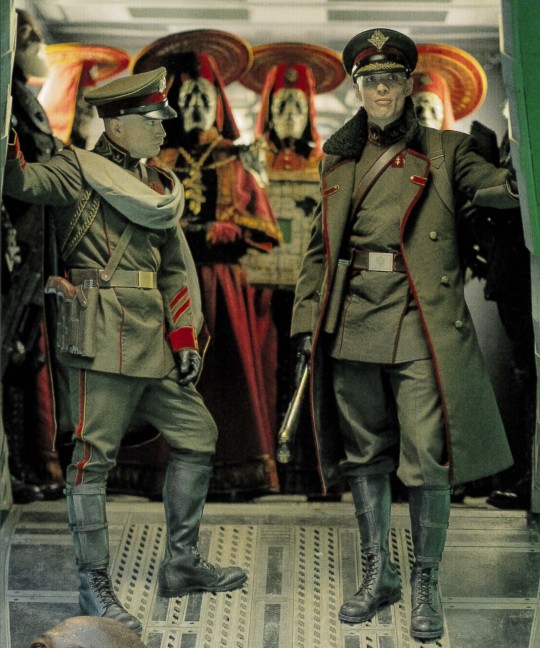
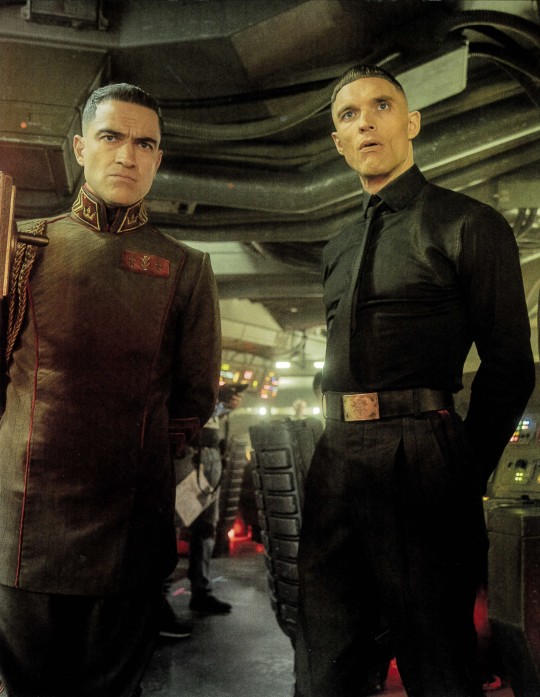
Admiral Atticus Noble (Ed Skrein) and his right-hand man Cassius (Alfonso Herrera).
Rebel Moon. Wolf: Ex Nihilo: Cosmology & Technology.
13 notes
·
View notes
Text
Fic: Winter happens, like a secret

Cesare x Lucrezia | Rated E | 3k words
Summary: Cesare has been gone for many weeks, fighting in the Romagna after the Sforza’s downfall, but one snowy Christmas Eve, he returns home to Lucrezia. Has she forgiven him for killing Alfonso?
The box was wrapped in a handkerchief, tied together with a velvet ribbon. Rather than look inside the box, she unravelled the red ribbon and slipped it around her brother’s neck. He chuckled. “What are you doing?” “You are my present this year,” she said. She pulled on the ribbon lightly, coaxing him closer though he could easily resist it if he so wished. He didn’t resist.
Loosely based on the infamous Folgers commercial, but set in Renaissance-era Italy.
Read on Ao3 or under the cut ↓
Lucrezia woke up in the middle of the night, her light slumber disturbed by a change in the luminosity beyond her eyelids. The night sky seemed aglow behind the curtains. The fire had faded down to embers, and warmth had seeped out of the room. She slipped on a red, fur-lined robe and went to the window. Outside, snowflakes drifted down from the sky, draping the garden in white. It was so bright, moonlight seemed to emanate from the ground itself.
She laughed, delighted by the snow, though the feeling in her heart was closer to melancholy than joy.
Tiptoeing down the stairs, she made her way to the kitchen. The cook and servants had been hard at work preparing food for tomorrow’s Vigila di Natale feast. Lucrezia filled a pot with water, added mint, honey, orange peels, ginger and tea leaves to it, then hung it above the fire in the hearth. Djem had introduced her to tea, and she was pleased to find some Asian ships, trading in the port of Naples, carried the leaves even though few locals drank it. She stirred the simmering water with a wooden spoon, and delicious aromas rose from the pot. She could have woken up a maid to make it, but she wanted to be alone. Admiring the falling snow through the frosted window, she warmed her hands on the earthenware cup and sipped her tea.
Inevitably, her thoughts turned to Cesare.
Lucrezia had spent the Novena— the nine days before Christmas— reflecting on the Bible, singing carols and praying in St. Peter’s. The Pope had commissioned a splendid Nativity scene, and boughs of evergreen perfumed the space with their scent so deeply associated with Christmas. The populace filled the basilica with joyous hymns and brightly coloured attires, unlike Lucrezia who wore her widow’s blacks and whose heart was too heavy to be lifted by music. Six months had passed since Alfonso’s death, regrets rather than grief filled her heart now. Soon, her father would seek to marry her off again. Though who would take her, when rumours of Cesare’s hand in murdering Alfonso circulated around Rome which in turn reignited the gossip of an incestuous relationship. Had anyone heard the prayers she whispered in her mind, it would only have added fuel to the fire: she prayed to rid herself of this sinful desire for her brother, prayed to hate him, but in the same second, she prayed for his safety, his return and his eternal love. She promised God a life of holy devotion yet longed for her brother’s presence and dreamt of his lips at her neck.
Cesare had been gone for months now, on some mission for the Holy Father— punishment for killing Alfonso and ruining their shaky alliance with Naples. Since capturing Caterina Sforza and killing her son and both her cousins, he had made many enemies. Yet he still pursued control over the Romagna. She and her parents hadn’t heard of him in a long time. And it seemed to Lucrezia that half her mind and heart were with him, somewhere beyond Rome. She willed each of her breaths to fill his lungs and each beat of her heart to push blood through his veins. In her darkest moments, she worried he had died, or worse, travelled back to France, to spend the holidays with his new family.
Still, she had made garlands of dried citrus slices to hang around the house and infuse her gloomy mood with merriment, for Giovanni’s sake. The scent of lemon and firewood filled their home. Cousin Adriana would arrive soon with her family, as well as cousins from Spain, seeking some favour from the Pope, no doubt. Would she be able to keep a smile on until Epiphany?
Lucrezia sighed. She’d drank half her tea without savouring it. Snow fell in big, fluffy clumps now.
A man on horseback came through the gates. The horse’s clip-clopping disturbed the silent night, and hoofprints marred the pristine snow. Fear clutched her guts— at this hour, he could only bring bad news. Sweat beaded down her spine as she imagined he would tell her Cesare had died.
The man appeared in no hurry to deliver the news. He stopped in the middle of the courtyard and waited for the stable boy to stumble out. She recognized the familiar grace with which he jumped off his horse, but she dared not hope. At last, the man lowered his hood and looked up in the direction of her bedroom window. Moonlight highlighted dark curls, stubbled cheeks and green eyes. Her heart leapt in her chest.
Lucrezia rushed towards the kitchen door and yanked it open just as he was reaching it.
“Cesare!” his name came out with a cloud on her breath.
She jumped in his arms, and he caught her as he had so many times before. His cold nose tip pressed against her neck and sent a shiver through her. The snowflakes dusting his hair melted against her flushed cheeks. Her other half was back, and her whole body sang with relief.
Holding her up, he carried her in, kicking the door close behind them with his foot. He murmured her name and sagged against her, tension released from his shoulders.
“Why are you slipping in during the night like a phantom?”
She kept her voice down. She should have woken up her mother who worried about Cesare too, but she wanted a moment alone with her dear brother.
“I could not wait any longer,” he said.
He slipped his hands under her dressing gown. However, the minute his frozen fingertips met her waist, she squirmed away with a squeal. He laughed at her reaction.
She loved his laughter, she had missed it. The way it came out of his throat in a burst of giggles, more high-pitched than expected, and how he would try to contain it, pressing his lips together but a smile always remained, like a mischievous kid.
Lucrezia took his large hands and rubbed them between her small palms, blowing warm breath on his fingers.
“I have missed those hands,” she said.
“And I have missed that face.”
They took comfort in repeating those words they had said years ago, as if they could have their innocence back. In that moment, they could pretend their relationship had not changed, that despite sharing a bed and killing Juan and Alfonso, they were the same boy and girl who had once reunited in a deserted Apolostic palace.
He kissed her hands, though with some restraint. His hasty departure, not long after Alfonso’s death, had left some things unresolved between them.
“I’m starving,” he announced.
Lucrezia lit a candle as he surveyed the food laid out in the kitchen.
“Ah, good food, at last,” he said, picking candied fruits and chestnuts from a silver plate.
She pushed his hand away. “It’s for the feast tonight.”
With a cheeky grin, he popped a few honey-coated pistachios in his mouth. She offered him some tea which he sipped gratefully. The stone floor was cold under her feet, so she hopped up on the wooden counter, pushing aside a bouquet of dried rosemary. As he drank and warmed himself, he kept stealing glances at her, studying her reaction to his return.
To be honest, Lucrezia was ambivalent. Though she was beyond happy to see him safe and home, of that there was no doubt, she questioned what form their relationship would take now. She knew what her body craved, what her heart hoped, but her rational mind cautioned her against it.
“I brought you something, sis, from far away.”
He should have waited until the 25th, but he never could restrain himself when he had an opportunity to cheer her up. And this proof that he had been thinking about her while he was away could only bring a smile to her lips.
The box was wrapped in a handkerchief, tied together with a length of velvet ribbon. Rather than look inside the box, she unravelled the red ribbon and slipped it around her brother’s neck.
He chuckled. “What are you doing?”
“You are my present this year,” she said.
She pulled lightly on both ends of the ribbon, coaxing him closer, though he could easily resist if he so wished— he didn’t resist. He stepped closer, leaning on his hands, placed each side of her knees. Sitting up on the counter, she was almost the same height as him. Suddenly serious, they looked into each other’s eyes, and she knew all too well these moments of tense silence in which one of them had to do the right thing. Neither of them looked away. She held onto the ribbon, and he stared at her, steadfast, intense. Anticipation made warmth pool low in her stomach.
She had tried taking a lover, but quickly grew bored of the affair. Cesare had ruined her for other men, it seemed— and wouldn’t he like to know that.
“You were my present too,” he said, in a low voice. “The day Mother put you in my arms, I had never held anything so precious.” He touched the ends of her loose blond waves as if it were spun gold. “I knew, even as a boy, that I would do anything to protect you…”
She realized then, this was about Alfonso.
“Do you forgive me?” he asked.
“We are Borgias, brother, we never forgive.”
He squeezed his eyes shut, pained to hear those words as much as she was to have voiced them.
“And so, I cannot forgive even myself,” she continued, finally saying aloud the thoughts that had plagued her but which she could not share with anyone, “for I also am to blame for my husband’s death.”
Cesare rested his forehead against hers, shaking his head in disagreement. She ran her fingers through his hair and gripped a fistful of curls.
“It is the truth,” she said.
“It was my fault. I wielded the blade and I—”
“Yes, you wielded the blade,” Lucrezia said, working open his leather doublet, stiff with cold, “but I wield your heart.” She slipped her hands inside, spreading them over his chest. “As you do mine.”
Under her palms, his heart was beating so fast it threatened to escape his ribcage. He could not deny the truth of her words.
“Peace, brother,” she murmured soothingly, caressing his chest. His skin was damp under the leather.
He rubbed his nose against hers, slowly, eyes closed, with none of the usual playfulness. He didn’t try to kiss her but neither did he step away. She tasted his honey-sweet sigh across her mouth.
“Lucrezia,” he whispered her name with such adoration, but tainted with pain and reluctance.
Why try to resist the inevitable? Was there virtue in a half-hearted effort?
“Make me yours again.”
His chest rumbled with something like a growl.
When she brushed her lips against his, he captured her mouth. He kissed her deeply, hands tightening in the heavy fabric of her robe.
Though she had not forgiven him in words, it was a kiss of absolution. Ardent and tender and so full of love, tears gathered at the corners of his eyes.
She loved him, always, in spite of everything. He had made her that way, with his gentleness and indulgence, with his jealousy and adoring gaze. She could not even hold it against him. She had blossomed in his light and always would seek it. Nothing else would do. No one else would do.
They broke the kiss well before they’d had their fill.
Cesare searched her face for a sign of reluctance or regret, but he found the opposite. There was still time for one of them to pull away— usually Cesare. Instead, his hand slid up her back, along her spine, to cup the nape of her neck. That touch always filled her with such a delicious haze. Even back when she was too innocent to understand what it kindled in her, she sought it, luxuriated in it. And just like that, God was sitting in the room with them again. Her chest swelled with elation and the top of her head tingled from a shower of invisible, yet tangible light which descended upon them, shielded them. And the silence, only broken by the crackling fire, became almost musical.
She touched Cesare’s chin, and he smiled.
“I’ve missed this,” he whispered before kissing her again.
She parted her lips for him, welcomed his tongue, and spread her legs.
Hips cradled between her thighs, he assailed her neck with ravenous kisses. In his hunger, he nearly ripped open her shift. Her dressing gown slipped from her shoulders. Her short nails raked down his abdomen, towards his belt.
The cold draught in the room was no match for the fever overtaking them. She made quick work of his codpiece, and he tugged her to the edge of the counter.
He pushed her shift up her thighs and, for a moment, seemed lost in the softness of her skin and marvelled at how small she was next to him.
Slipping her hand inside his pants, Lucrezia spurred him back into action. He bucked his hips into her palm with a ragged moan and found her wet and wanting under her bedclothes.
Cesare sought her gaze then entered her in one long, luxurious thrust. Pleasure knocked the breath from their lungs as they clung to each other.
She used to think time and longing had embellished her memory of their lovemaking. Surely, it could not have been as amazing as she made it out to be in her mind. But it was. A miracle. Rapture. She could not doubt they were two halves of the same whole, meant to be together lest they withered apart.
Already pleasure made her toes curl and her core clench with each thrust.
“Oh, God!” she moaned, throwing her head back.
“I don’t think God wants anything to do with this,” he joked.
“Then he should not have made you so well-endowed.”
He grinned, and she kissed him, wanting to taste his joy, to take it inside herself.
Laughter and sighs of pleasure mingled as they moved together.
Anyone could have walked in on them, embracing passionately in the kitchen, but they were too far gone to care.
-
Out of breath and utterly satisfied, Lucrezia slumped down on the counter, “Happy Christmas,” she said.
He smiled, gazing down at her, admiring her body where her shift clung to her sweat-damp skin. The ribbon still hung around his neck, and she used it to pull him down to her for a kiss.
“I think I’d better not let you get used to having me on a leash,” he said as if that had not already been the case for years.
He removed the ribbon from his neck and tied it in a bow around hers.
“Beautiful,” he said.
He was still in her, half-hard, her legs locked around his hips. There was a risk, she knew, that she might become pregnant. Would the Pope believe it was another Immaculate Conception if she said so? The thought amused her rather than scare her.
After gathering food and wine, they headed upstairs to her bedroom.
Cesare put another log in the fireplace and stirred the embers. He spared a moment to check on his godson, sleeping in the adjoining room.
“Giovanni asked for you yesterday,” she said.
“Perhaps that’s why I was in such a hurry to come back and rode through the night.”
“Or is there another reason, perhaps?”
She tilted her head with an impish smile.
He hooked a finger under the ribbon at her throat and brought her lips to his. His kiss warmed her to her toes.
“Will La Befana bring your son sweets or coal?” he asked.
“Sweets, of course. He’s a angel.” She smiled proudly.
“And tell me, my love, what will she bring me?”
“We shall make our own sweetness, Cesare.”
She picked a sweet from a plate and fed it to him. He sucked the sugar from her fingertips and peppered kisses down her wrist. In one swoop, he picked her up and carried her to bed.
They cuddled under the covers, and talked of nothing important until the room was warm enough they could undress completely. Skin to skin, bodies entwined, they reaffirmed their bond and commitment to each other.
It was one of the longest nights of the year, but the sun seemed to dawdle beyond the horizon just for them.
In the morning, he would pretend his room was too cold without a fire or that he’d lost his way in the dark palazzo after weeks away. Outside, snow still blanketed Rome, it would melt in the daylight, but for now, it protected them with its silence and purity.
#The Borgias#Cesare/Lucrezia#Cesare x Lucrezia#Borgiacest#lostinfic writes stuff#winter happens like a secret
34 notes
·
View notes
Text
New Headcanons for the Sing Hunger Games Idea
Marcus is the youngest victor in Panem's history up to that point, being fifteen when he won his Games. He also proposed to his girlfriend Megan before he left for the Games. Her parents wouldn't give their blessing, but immediately did so when Marcus returned to District 2 and proposed to Megan again. She said yes both times.
Marcus was also a volunteer, but unlike most from District 2, he didn't volunteer because he wanted to. He went in place of one of his brothers.
Johnny knows his father's past, but Marcus never talks about it for good reason, despite being a favorite in the Capitol and as a result, having to return to the Capitol each year for the Games.
Ash is from District 4, and up until the Games, she spends most of her time in a boat on the water, playing her guitar.
Darius is also from District 4, often citing how he'll definitely win the Games if he ever competes, since part of the Games are a reality show/beauty contest. When the pair are chosen as this year's Tributes, Ash often thinks Darius will have to rely on his sponsors since he can't fight.
Rosita is from the Capitol and (reluctantly) one of the Gamemakers. While she is thankful that none of her twenty-five children will ever have to enter the arena, she also feels guilty because of how her job will affect (and in some cases, end) the lives of other people's children.
Jimmy and Porsha are also from the Capitol, with Jimmy being one of the most vocal in his support for the Games. He's also 'good friends' with past victor and current mentor, Marcus.
Gunter is one of the only living victors from District 8. After his Games, like other victors, he had to have a talent for his public image, which turned out to be designing and making clothes, along with dancing. Not only is this something he genuinely is passionate about, but he also has years of practice, having worked in one of the many textile factories before he was reaped into his Games. Dancing is also a way to cope with the traumatic memories of what Gunter endured in the arena.
Meena still bakes, with her family owning and operating their own bakery in their District. While it is still a business, Meena often donates food to hungry families in an attempt to help others in her District. Which breaks the hearts of many when she is ultimately reaped into the Games, including Alfonso, the elephant who admires her from afar and volunteers to help protect her in the arena.
That's all for now, but I am still super excited about this story coming to fruition and I hope you all will be too!
#sing 2021#sing johnny#sing 2#sing big daddy#sing marcus#sing meena#sing rosita#sing ash#hunger games fanfic#sing fanfiction#Sing Hunger Games#Get ready for a whole lot of angst#im so evil#I'm putting these poor characters through the ringer#Then again this is a dystopian society#of course Rosita would be a Gamemaker with her talents#sing alfonso#yes alfonso volunteered#why wouldn't he?#who wouldn't volunteer for Meena?
14 notes
·
View notes
Text

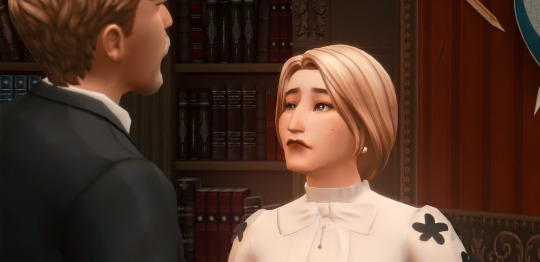
"I take it your morning tea with my mother didn't go well."
"No," Alice confirmed.

George gave an involuntary shudder, then nodded to his daughter. His reaction was blunt, it was brutally honest and unhidden.
Gwyneth was... a problem. Had always been. George wondered if he had ever had a chance to be a well-adjusted person at all; or if being the heir to the throne and the son of a depressed King and a toxic rubbish pit of a mother meant there was never any hope.
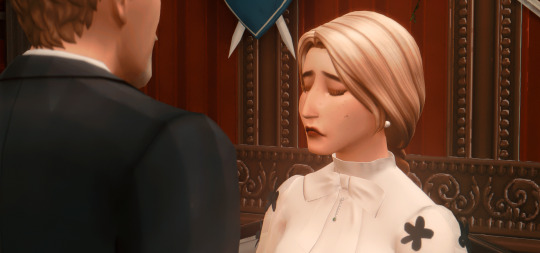
He saw a tension in Alice release, seemingly melting away. Her shoulders dropped and she took a deep breath before letting it out; her expression dolorous.
"I know you've been drinking this morning, like you always do, but we have to talk--"

"--I haven't," George cut in wearily, but then added: "... I have," he admitted reluctantly. "I've... tried. I must admit, something... stopped me. I cannot bear to look at it." He gestured to the half-empty glass on his desk.
Alice huffed. "Dad--"
George rubbed at his temples. He could feel the ache of sobriety, the sickening pull of his body's dependency on liquor, all tugging at him like shackles of his own making. It was the truth that he couldn't bear to look at it, but the song of his alcoholism was a chorus of sirens all the same.
"You're right. We do need to talk, Princess."

If Gwyneth was one of the root causes of George's dysfunctional life, then surely his own choices were the sabotage of that wretched tree.
Perhaps he never would have turned out to be a good man. But in watching his daughter, with whom he had such a strong bond, he could not help but admire the strength and persistence of her spirit. And in truth, Arthur too, inspired him--more to jealousy, envy, rather than to happiness that a father should have had as he watched his son grow to surpass him.
"Come," George gestured to several chairs by the fireplace. "Let us sit and talk. You needn't fear any reprimand from me for being honest about what my mother has said to you." * * *

George settled with Alice by the warm and crackling fire to talk-- about plans for the dinner for Arthur's return, about Gwyneth--

--that was the real icebreaker for them both.
The conversation moved to his drinking, what he planned to do to curb such a difficult and dangerous habit. It took a great deal of squeezing his fingers into his palms, of discomfort and awkward anxiety that made him sweat, a bit of stammering, but he... asked Alice... for advice.

They talked about Alfonso, about little Carmen too.

Christ...
How long had it been since he had been somewhat clear-headed enough to talk like this with his daughter?

... How long had it been since he had been able to talk like this with his remaining son?

... George couldn't remember.
He had no idea where things might go from here, outside their initial plans for Arthur's return--and his own, to speak with the royal physicians-- but faced with a measure of clarity he had scarcely felt in years, he was not about to just let that go.
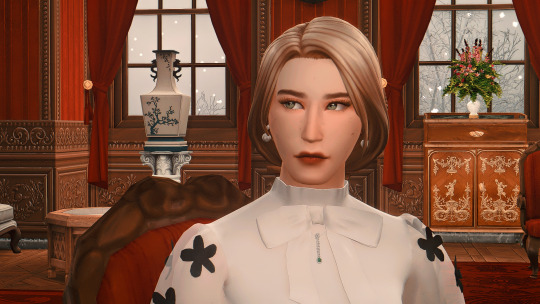
"Dad," Alice said at last, ready to rise from her seat, eyes focused so keenly on her father, "I'd better get to planning this dinner. Will you be alright?"
George managed a small smile for Alice's concern.
"I can't promise that, Princess, only that I will try."

---
Progress??????? Let's see if he can stay relatively on track. Improvement and healing are not straight lines. Personal progress is not linear. But let us hope a real attempt is really made.
- - -
PREV | BEGINNING | NEXT
- - -
12 notes
·
View notes
Text
literally no one asked, but i want to dig into the context of what’s happening in the montage from today, so here's that, with Images added in for cross-timeline reference and such:
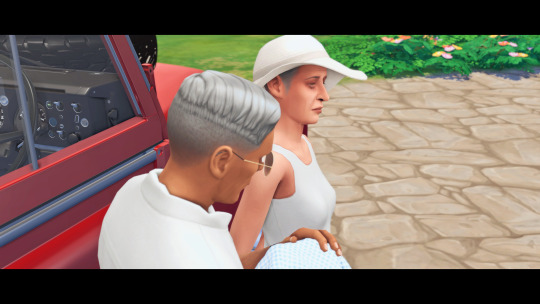
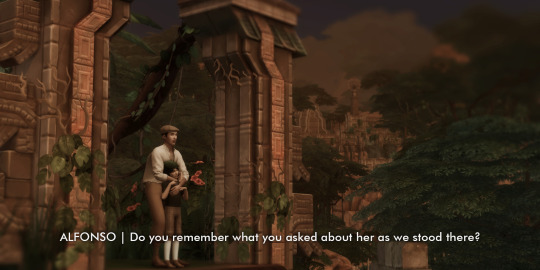
i started with the beatriz and sal scene for aesthetic reasons, but !!! it establishes that they’re at alam palace. for those who’ve read the main story, you may know that that’s where the family used to go for their getaways. for those who pay close attention, you may recall that beatriz does not take her family there. she associates it strongly with her childhood and, specifically, with her father. beatriz isn’t someone who likes to wallow in her feelings or face tough emotional truths. so, going there to mourn her daughter is significant … it’s a continuation of how she’s reacted the entire time—wanting to be vulnerable but in an unforgiving, almost masochistic way. i just thought sal doing car stuff would be cool and sexy of him. this family loves cars because i love cars lkfgjdg

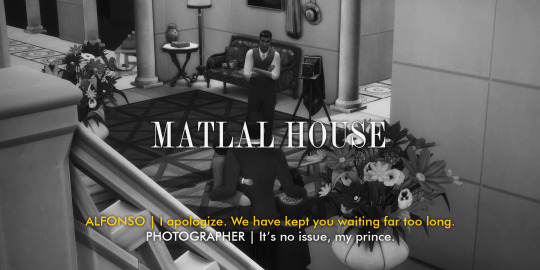
i have arnaut and lorraine moving into matlal estate next. this is where alfonso and rowena are living as of where the main story left off. arnaut is taking a big box from her, and they’re chatting as they supervise the moving. relocating internationally with very short notice … whew! mourning for them isn’t the quiet repose that it should be. we’ve already seen that arnaut is clinging to his new role—trying to distract himself, i think, with what’s basically performing who he thinks he has to be now. getting his family settled is an easier task than sitting with his feelings.


then, we have blanca and her family. i had a vivid image of them resting together, specifically with blanca wide awake as the others slept. we know that she’s beset with guilt about the way she's raising her sons, but we also know that she’s choosing to be defiant and stick to her guns over it. is it selfish of her to choose her career over her family? i suspect she rejects the premise of that question, even if the world is insisting that it is that simple.
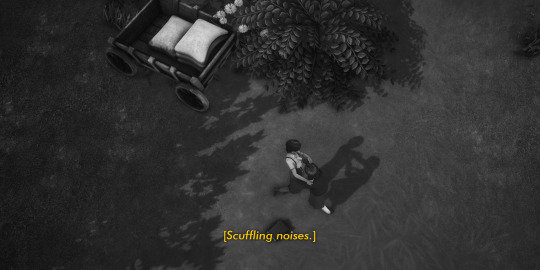
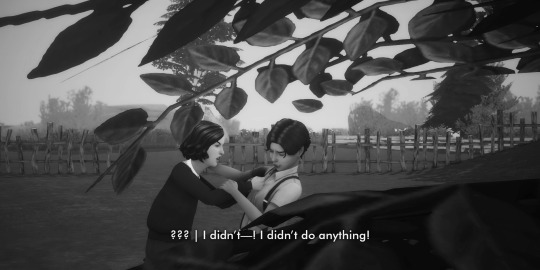
speaking of guns, beatriz at the range is one of my favorite parts. this scene was a bitch to create partly because i had to turn those headphones from a deco item into an accessory. anyway, i wanted to do this because i think having shooting as a hobby—as a way to focus and relax—is revealing. it’s easy to point at the implication of violence, but that’s not really what this says to me. i guess it’s because i know what happens in beatriz’s life that the story hasn’t covered yet. like i said, she’s a world war two girl, her father and sal are war veterans, and uspana is a historically martial society. it’s also, to me, suggesting that beatriz isn’t all bluster. she’s not just capable of talking the talk. she's a hands-on person, and she's nowhere near delicate.

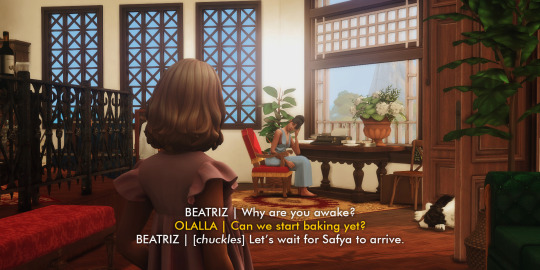
olalla is a baker! admittedly, she is among the least developed of beatriz’s children. i just haven’t had much use for her yet, so the facts that she’s always loved baking and is a celebrity chef are basically it.

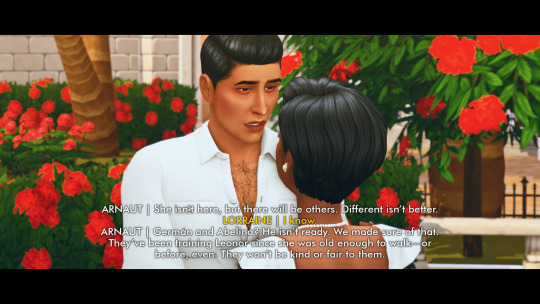
gil needed his own scene, and i decided that focusing on the horde of little boys converging on nakawe palace would be the best approach. children handle grief in their own way. we could’ve seen him struggling to process the loss and being inconsolable, but i think it’s also interesting that he has these cousins who want desperately to cheer him up—and, of course, that julian and damian can relate to the feeling of loss because safya was their caregiver, too. german is brand new and doesn't really even speak the language yet, but there he is … they're all there for each other the only way little kids know how.

martin goes out on the water to get in his feelings, which i think is valid and admirable. gabe summoned the image of him “screaming at the sea” and, while i couldn’t recreate it perfectly and was too lazy to make a pose, that is the vibe. that’s really all we need to know about martin right now. he has a speaking role later on in episode four, and he’ll reference this scene in that one.
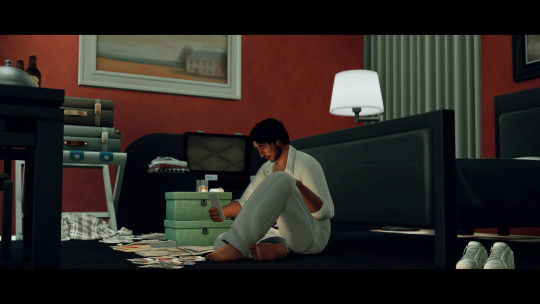
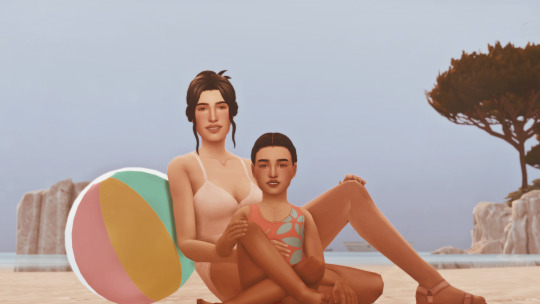

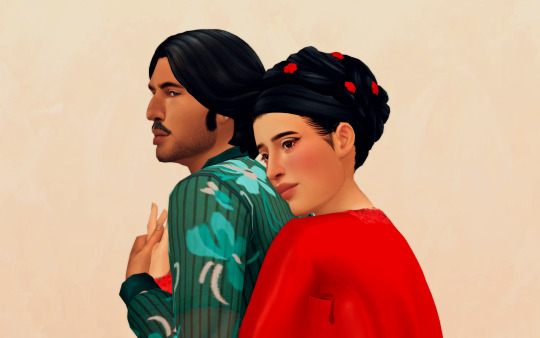
next, rodrigo and his photographs … there’s actually so much going on in this scene! the setting is important to me because i tried to make it obvious he’s in a hotel room. rodrigo hasn’t been home since safya died. he isn’t even sure he has a home at this point. no one has really told him anything except to stay away and, even then, he's being talked to by nobody aides who shouldn't even be able to look at him without asking first. he’s doing his mourning in a hotel room because he isn’t welcome anywhere else, and safya isn’t around to insist he be treated like the family member he is. it’s also telling that no one else seems to have stepped up for him. the polaroid images are mostly screenshots of safya that i already had; i like that you can make out most of them
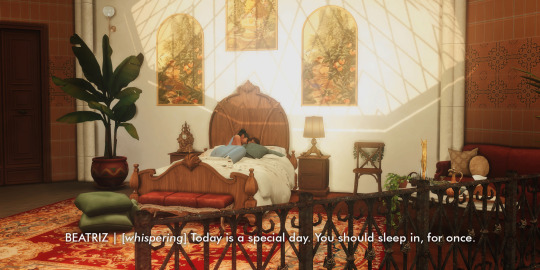
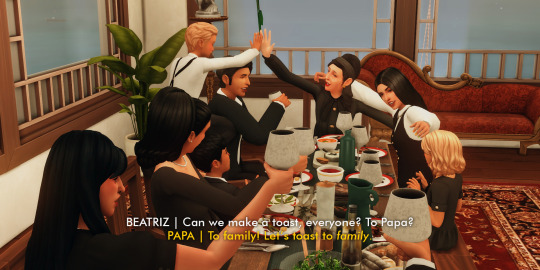
matias, like leonor, is mourning mostly in solitude. i think it would have been his preference to stay in nakawe, but he also knew he couldn’t bear letting beatriz leave without him. as we can see, she feels the same way. she could have a servant bringing him food, but she does it herself instead. he shouldn’t be talking to her, not when his desire is the full solitude, but he can’t help it.


i was unsure of what to do with mateo, but i decided that he would be missing his father, and that’s worth showing. you can’t really tell what he’s up to just by looking at the images, but i think it’s also interesting that he’s sharing whatever he’s writing with prissy. she was comforting him in the background of the dinner scene from episode one, and here she is again. it'll come up again later, but i keep wondering what it must be like to be a teenager caught up in all of this, with a younger brother who's too little to ask questions and an older sister who's too independent to answer yours.

sebastian is the most underdeveloped of beatriz’s children, but i always imagined him as somewhat removed from them all. i was looking at the family holistically, wondering what was missing, and realized we didn’t really have a contrasting extreme to what leonor is doing. partying—and, specifically, doing it privately as only someone with wealth and privilege can manage—to stave off having to actually engage in the work of mourning felt right. there are people who can never be along with their thoughts, who would rather die, and sebastian is one of those people.

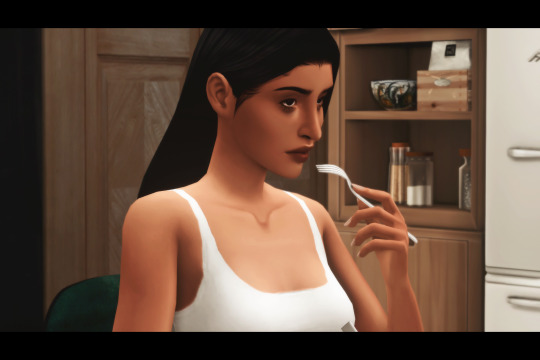
finally, we had to end with leonor. my idea was always that she would be decomposing in her house the entire time. it's because she's a devout person, but it's also because she has this deep fear that she has done something, in a spiritual sense, terribly wrong. i didn’t quite know how to encapsulate where she is visually, but then i realized—duh!—the art element is pretty relevant to the entire story. it’s something she shared with her mother, and she does eventually end up in armorica as an art student. she’s looking in our direction, entirely alone but knowing that she is being perceived. so, it’s a spiritual thing, in a way, but i suppose also a bit of foreshadowing, if you read into it enough.
#idk this is a meta post but i don't have a tag for that#reyes.meta#new tag#maybe i should just start doing this dskfjdsf#graduate to Insufferable
17 notes
·
View notes
Text







Bye you son of a bitch.
It's a great touch how every admiral sans Vigoro (Who BTW is voiced by the legendary Charles Martinet i.e Mario's former VA.) met their end as a direct result of their principles. Loco was motivated by revenge and was simultaneously blown-up and crushed by his own gimmicky ship's failure. Alfonso died whilst shamelessly trying to garner power in Valua by tattling to the empress about Galcian's treachery, Gregorio died protecting the party after realizing that Enrique was absolutely rightand Belleza sacrificed herself as penance for the mass murder of the Valuan people and took Galcian with her. Vigoro seeks his own destiny and breaks away from the armada thus is spared.
3 notes
·
View notes
Text
14th part of the bookscans of Al Andalus. Historical Figures, here's the previous part
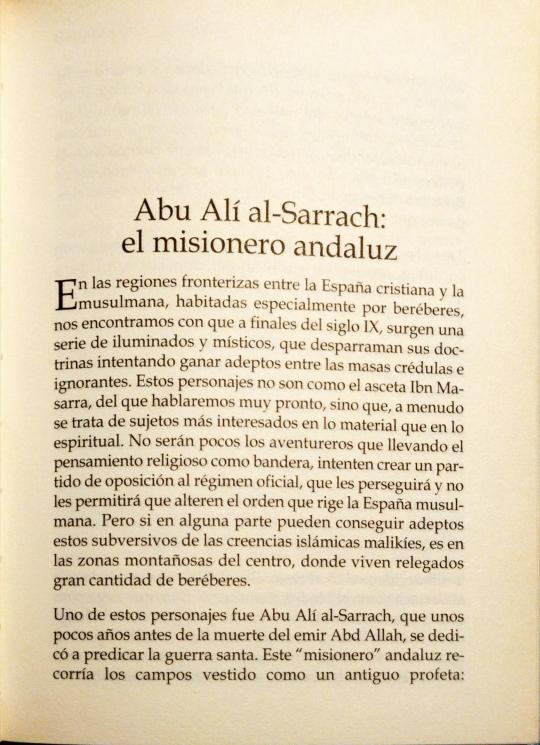
Abu Ali al-Sarrach: the andalusian missionary
In the border regions between Christian and Muslim Spain, inhabited especially by berbers, we find that at the end of the 9th century, a series of enlightened and mystical ones arise, who spread their doctrines trying to gain followers among the gullible and ignorant masses. This characters are not like the ascetic Ibn Masarra, of whom we will speak very soon, but rather, are often subjects more interested in the material than in the spiritual. There will be few adventurers who carry religious thought as flag, try to create an opposition party to the official regime, which will persecute and will not allow them to alter the order that governs Muslim Spain. But if somewhere these subversives of the Maliki Islamic beliefs, it is in the central mountainous areas where they live relegated a large number of Berbers.
One of these characters was Abu Ali al-Sarrach, who a few years before the death of the emir Abd Allah, he dedicated himself to preaching holy war. This Andalusian "missionary" toured the fields dressed as an ancient prophet:
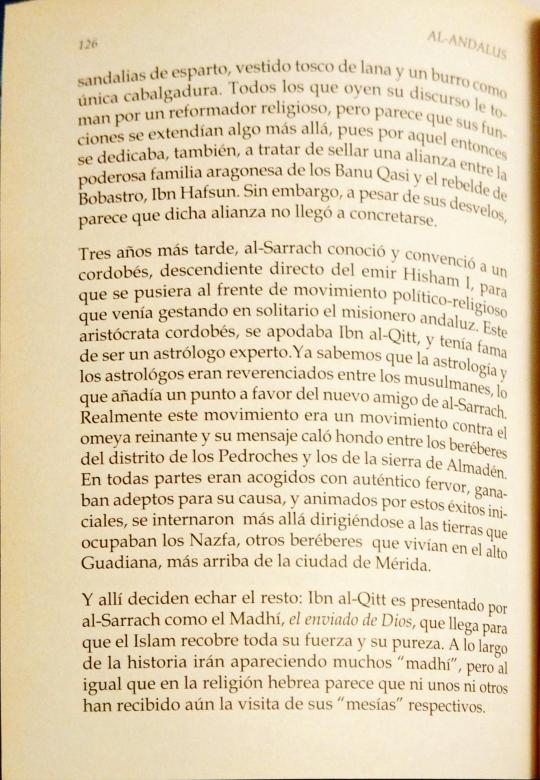
esparto sandals, a rough woolen dress and a donkey as the only ride. All who hear his speech take him for a religious reformer, but it seems that his functions extended somewhat further, since at that time he was dedicated, also, to try to seal an alliance between the powerful Aragonese family of the Banu Qasi and the Bobastro rebel, Ibn Hafsun. However, despite their sleepless nights, it seems that this alliance did not come to fruition.
Three years later, al-Sarrach met and convinced a man from Córdoba, direct descendant from the emir Hisham I, so that he would put himself at the head of the political-religious movement that the Andalusian missionary had been developing alone. This aristocrat from Cordoba, his nickname was Ibn al-Qitt, and he was reputed to be an expert astrologer. We know that astrology and astrologers were revered among the Muslims, which added a point in favor of al-Sarrach's new friend. This movement was really a movement against the reigning Umayyad and his message resonated deeply among the Berbers of the Pedroches district and those of the Almadén mountain range. Everywhere they were welcomed with authentic fervor, they won followers of their cause, and encouraged by these initial successes, they went further heading to the lands occupied by the Nazfa, other Berbers who lived in the High Guadiana, above the city of Mérida.
And there they decide to do the rest: Ibn al-Qitt is presented by al-Sarrach as the Madhi, the messenger of God, who arrives so that Islam regains all its strength and purity. Throughout history many “madhí” will appear, but as in the Hebrew religion, it seems that neither of them have yet received a visit from their respective "messiahs."
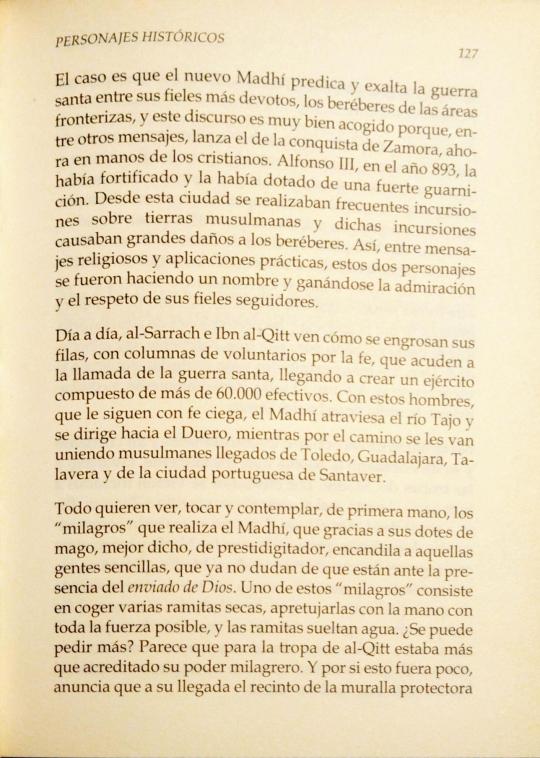
The fact is that the new Madhi preaches and exalts holy war among his most faithful devotees, the Berbers of the border areas, and this speech is very well received because, among other messages, it launches that of the conquest of Zamora, now in the hands of Christians. Alfonso III, in the year 893, had fortified it and provided it with a strong garrison. From this city frequent raids were made on Muslim lands and these raids caused great damage to the Berbers. Thus, between religious messages and practical applications, these two characters left making a name and earning the admiration and respect of his loyal followers.
Day by day, al-Sarrach and Ibn al-Qitt see their ranks swell, with columns of volunteers for faith, who respond to the call of holy war, creating an army composed of more than 60,000 troops. With these men, who follow him with blind faith, the Madhi crosses the Tagus River and heads towards the Duero, while along the way they are joined by Muslims arriving from Toledo, Guadalajara, Talavera and the Portuguese city of Santaver
Everyone wants to see, touch and contemplate, first-hand, the “miracles” the Madhí performs, who thanks to his skills as a magician, or rather, as a conjurer, dazzles to those simple people, who no longer doubt that they are in the presence of the sent from God. One of these "miracles" consists of taking several dry twigs, squeeze them with your hand as hard as possible, and the twigs release water. It seems that for al-Qitt's troops his miraculous power were accredited. And if this were not enough, he announces that upon his arrival the premises of the protective wall
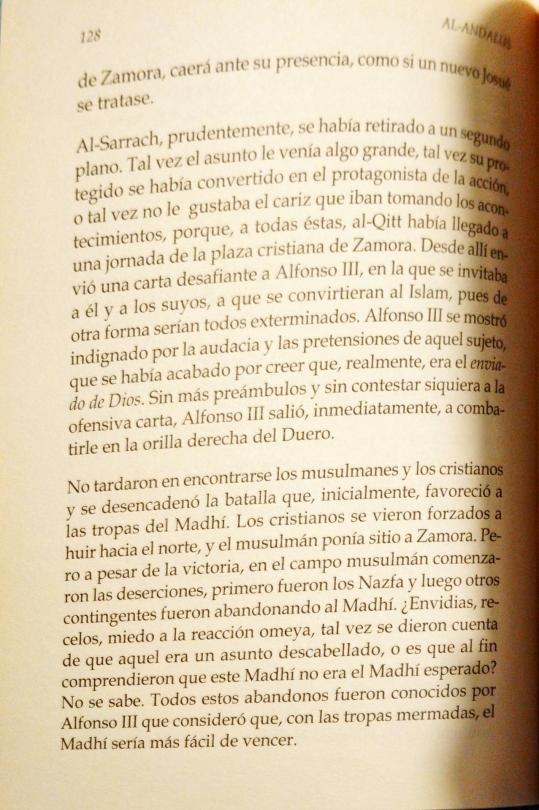
of Zamora, will fall before his presence, as if it were a new Joshua.
Al-Sarrach had prudently retreated into the background. Maybe he something big was coming to him, perhaps his protégé had become the protagonist of the action, or maybe he didn't like the direction the events were taking events, because, in all of these, al-Qitt had reached a day of the Christian stronghold of Zamora. From there he sent a defiant letter to Alfonso III, in which he and his people were invited to convert to Islam, since otherwise they would all be exterminated. Alfonso III was outraged by the audacity and the pretensions of that subject, who had ended up believing that, truly, he was the messenger of God. Without further ado and without even answering to the offensive letter, Alfonso III immediately went out to combat him on the shore right of the Duero.
It didn't take long for Muslims and Christians to meet and the conflict was unleashed, battle that, initially, favored the Madhi troops. The Christians were forced to flee to the north, and the Muslims laid siege to Zamora. But despite the victory, desertions began in the Muslim camp, first it was the Nazfa and then other contingents abandoned the Madhi. Envy, jealousy, fear of the Umayyad reaction, perhaps they realized that it was a crazy business, or did they finally understand that this Madhí was not the expected Madhi? It is not known. All these abandonments were known by Alfonso III who considered that, with the troops depleted, the Madhi would be easier to defeat.
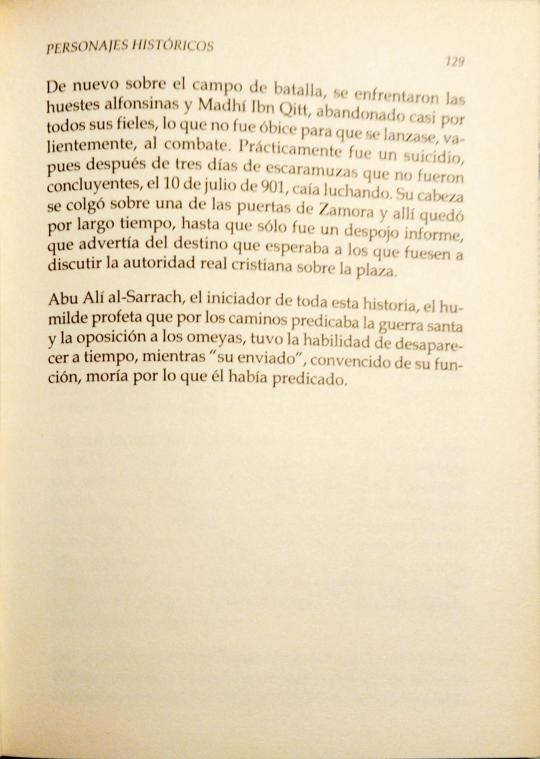
Again on the battlefield, the Alfonsine and Madhi hosts faced each other. Ibn Qitt, abandoned almost by all his followers, which did not prevent him from bravely throw himself into combat. It was practically a suicide, because after three days of inconclusive skirmishes, on July 10, 901, he fell struggling. His head was hung over one of the doors of Zamora and there it remained. long time, until it was only a shapeless wreckage, warning of the fate that was waiting for those who were going to discuss the royal Christian authority over the stronghold.
Abu Ali al-Sarrach, the initiator of this whole story, the humble prophet who for the roads he preached holy war and opposition to the Umayyads, he had the ability to disappear in time, while “his envoy”, convinced of his function, died for what he had preached.
#al andalus historical figures#al andalus personajes históricos#book scans#bookblr#historyblr#al andalus history#al andalus#spanish history#abu ali al-sarrach#ibn al-qitt#emirate of cordoba
2 notes
·
View notes
Text
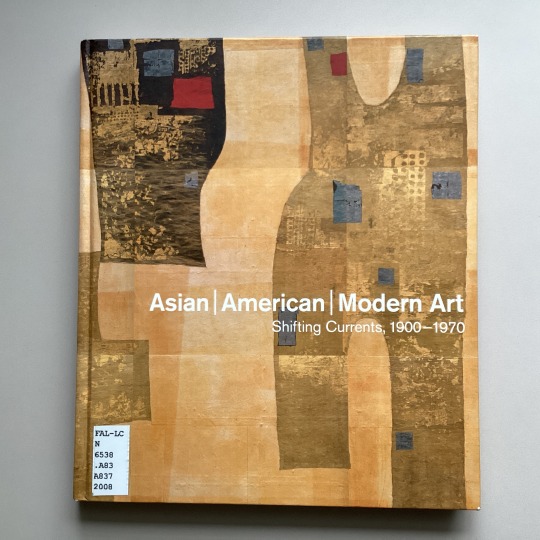
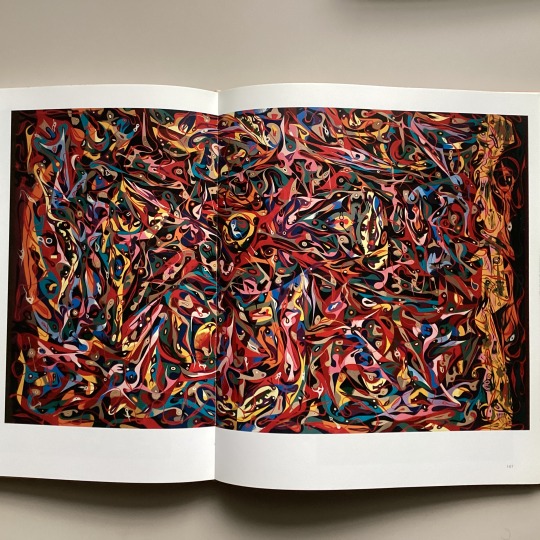
Alfonso Ossorio (b.1916, Manila, Philippines – d. 1990, New York, NY) was born in the Philippines to wealthy parents of Chinese, Filipino, and Hispanic ancestry. He moved to the United States in 1930. He studied at both Harvard University and the Rhode Island School of Design and then served in the military as a medical illustrator during the World War II.
His oil painting entitled “Beachcomber” (1953) is densely patterned with non-Western visual icons and images similar to the tribal art of Oceania which Ossorio admired at the Peabody Museum while an undergraduate at Harvard. The entire canvas is filled with endless sea of abstract forms, creating horror vacui, leaving a very little emptiness for viewers.
Image 1: Front cover of “Asian|American|Modern Art
Image 2: Alfonso Ossorio, “Beachcomber,” 1953, Oil on canvas, 84”x 144”
Asian American modern art : shifting currents, 1900-1970 Daniell Cornell and Mark Dean Johnson, editors ; Gordon H. Chang ... [et al.]. San Francisco, CA : Fine Arts Museums of San Francisco ; Berkeley : University of California Press, c2008. English HOLLIS number: 990117463940203941
#AsianAmericanandPacificIslanderHeritageMonth#AAPIHeritagemonth#AAPIheritage#AAPI#AlfonsoOssorio#AsianAmericanartist#FilipinoAmericanartist#HarvardFineArtsLibrary#Fineartslibrary#Harvard#HarvardLibrary#harvardfineartslibrary#fineartslibrary#harvard#harvardfineartslib#harvard library#painting
9 notes
·
View notes
Text

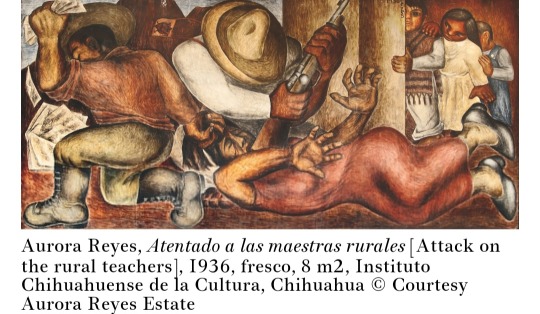
The first mural painted by a woman in Mexico was called 'Attack on Rural Teachers.' This is one of seven murals created by painter, poet, musician and writer Aurora Reyes Flores.
A passionate admirer of the Cuban revolution, friend of Frida Kahlo, niece of Don Alfonso Reyes, and leader of the feminist group Las Pavorosas, Aurora was the first female Mexican muralist. She was born in Hidalgo de Parral, Chihuahua, and adored the area she grew up in, where snakes, tarantulas and other animals roamed the desert. She was known as 'La Cachorra' because of her bravery and the brown hair she left free or tied in a thick braid on top of her head.
At eighteen she became pregnant and entered the teaching profession in 1927. She also began writing poetry. The first poem she published was 'Man of Mexico,' in 1948:
[...] Something dark has passed through the sky of Mexico.
The earth is wounded
And on the lips of the wind
The sharp edge of ancient prophecy whistles
She turned her attention to the secular voice of the stone gods, raised the word from its cage of verse and made it an incantation, and a spell, a vehicle for solidarity in action.
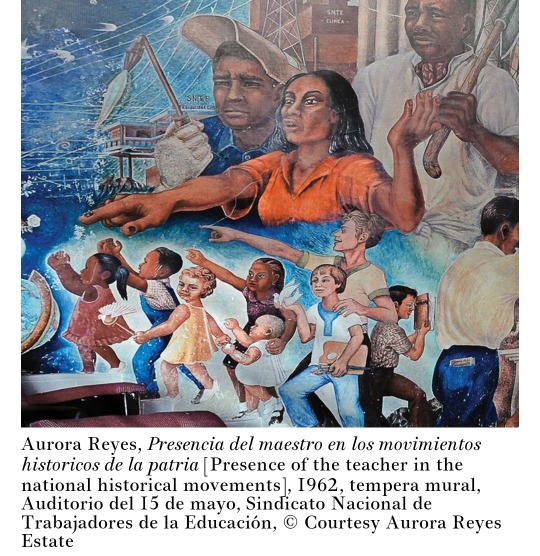
"Aurora was the perfume of an angry magnolia, rebellious petals raised in arms. In her poetry she was a flower full of rage," said Roberto López Moreno.
"In her poetry, she goes out of her way to look at the world. She does not remain in self-pity, she goes to the light, goes down the roots to reconnect with the history of a people, of which she is painful clay; a pain that disputes its space in the cosmos already captured by our ancestors, captured in the stone and in the hieroglyph."
In La Mascara Desnuda [the Naked Mask], she says:
"[....] I will dress my death in yellow
I will decorate its foot with bells
And I will crown it with forget-me-nots"
When she died, Aurora's ashes were buried in the roots of a magnolia that she had planted many years before in the garden of her house in Coyoacan, in Mexico City, on Xochicaltitla Street. On the trunk of the magnolia, her son, the actor Hector Godoy, had a metal plaque placed with some verses that Aurora had written to that tree.


3 notes
·
View notes
Text
BLOG LITERARIO- Insumo#2
"Cien años de soledad"
Autor: Gabriel García Márquez
Género: Realismo mágico
Reseña:
Cien años de soledad de Gabriel García Márquez es una obra maestra del realismo mágico que transporta a los lectores a un mundo mágico y deslumbrante donde la línea entre la realidad y la fantasía se desdibuja de manera magistral. Esta novela, publicada en 1967, es un viaje épico a través de la historia de la familia Buendía en el ficticio pueblo de Macondo.
Trama: La historia se inicia con la fundación de Macondo por parte de José Arcadio Buendía y Úrsula Iguarán, dos primos que se casan y se sumergen en una genealogía llena de fatalidades y misterios. La novela abarca siete generaciones de la familia Buendía, narrando su ascenso y caída, mientras se entrelaza con los eventos históricos de Colombia.
La trama es una red intricada de amores prohibidos, guerras, prodigios sobrenaturales y obsesiones que mantienen al lector absorto desde la primera página hasta la última. La habilidad de García Márquez para tejer una narrativa compleja y coherente a lo largo de varias generaciones es verdaderamente admirable.
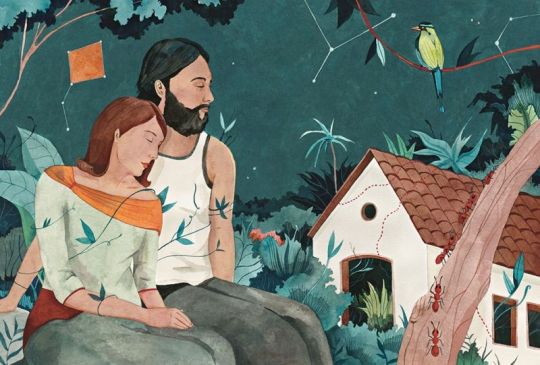
"La Cruz del diablo"
Reseña:
Es un libro narrado por Gustavo Adolfo Bécquer que se basa en una leyenda. En este relato, Bécquer nos cuenta la historia de un hombre malvado cuyo poder era tan grande que incluso el Rey prefería ignorar la situación. El pueblo experimenta un gran alivio cuando este hombre se marcha, ya que vivían con miedo constante, especialmente al hacer actividades como pastorear el ganado. Sin embargo, el Señor Feudal regresa después de un largo tiempo, sumiendo al pueblo en otra era de temor al exigir todo lo que antes le pertenecía. Él libro nos revela que el Señor Feudal vendió su alma al Diablo, y al final su armadura, en la que se cree que habitaba el Diablo, es fundida y convertida en una cruz. Además de estos eventos, el libro también presenta una banda de bandidos que elige el antiguo castillo del Señor Feudal como escondite y comienza a cometer crímenes horribles. En resumen, es una historia fascinante y cautivadora que vale la pena leer detenidamente.
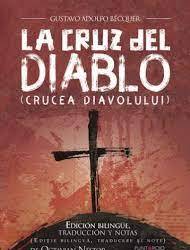
"Huairapamushcas: hijos del viento"
Género: Realista
La novela "Los hijos del viento" fue escrita por el escritor ecuatoriano Jorge Icaza y fue publicada por primera vez en 1928. Esta obra se considera una de las obras más importantes de la literatura latinoamericana del siglo XX y ha tenido un impacto significativo en la literatura social y política de la región.
La novela gira en torno a la explotación laboral en las haciendas agrícolas de la costa ecuatoriana. Icaza muestra de manera cruda y realista las condiciones inhumanas a las que se ven sometidos los trabajadores, especialmente los peones afroecuatorianos e indígenas. El autor describe las luchas y desafíos que enfrentan los marginados a través de personajes como Alfonso Pereira, un joven idealista, y Rosita, una joven indígena.
Uno de los puntos fuertes de la obra de Icaza es su capacidad para presentar de manera vívida y auténtica la vida de los campesinos indígenas, destacando la riqueza de su cultura, creencias y relaciones con la naturaleza. Icaza logra transmitir a través de una prosa poderosa y evocadora la dureza de la vida en el campo y la resistencia indomable de los personajes frente a la injusticia y la opresión.
Además, la novela aborda temas universales como la explotación laboral, la desigualdad social y la lucha por la justicia, lo que la convierte en una obra que trasciende límites geográficos y temporales. "Huairapamushcas" no solo cuenta la historia de Ecuador en su época, sino que también ofrece una reflexión profunda sobre la condición humana y la búsqueda de dignidad y libertad.
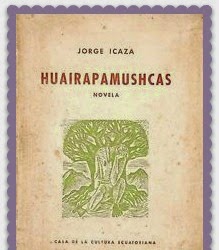
"En Medio de la Guerra"
es una novela escrita por el autor mexicano José Emilio Pacheco, publicada en 1981. La historia se desarrolla en el contexto de la Revolución Mexicana y sigue las vidas de varios personajes que se ven atrapados en medio del conflicto armado.
La novela ofrece una visión cruda y realista de los horrores de la guerra, mostrando cómo afecta a personas de diferentes clases sociales y edades. Pacheco utiliza una narrativa poderosa para explorar temas como la violencia, la pérdida, la lealtad y la búsqueda de la identidad en tiempos turbulentos.
A través de personajes complejos y bien desarrollados, el autor teje una trama que cautiva al lector y lo sumerge en el caos y la incertidumbre de la Revolución Mexicana. "En Medio de la Guerra" es una obra literaria que no solo ofrece una perspectiva histórica fascinante, sino que también plantea preguntas profundas sobre la condición humana en situaciones extremas. Es una lectura recomendada para quienes buscan una exploración literaria de un momento crucial en la historia de México.

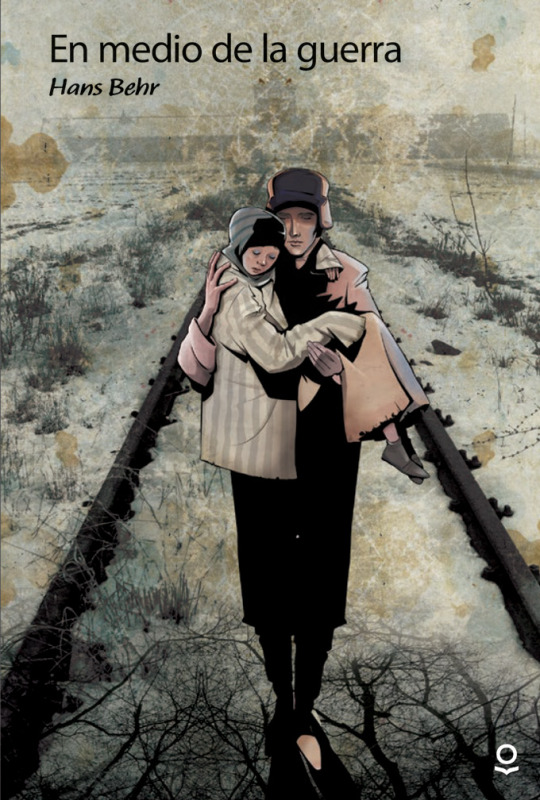
INTEGRANTES:
Melanie Ruiz
Lía Pine
Angie Silva
Ismael Bermúdez
3 notes
·
View notes